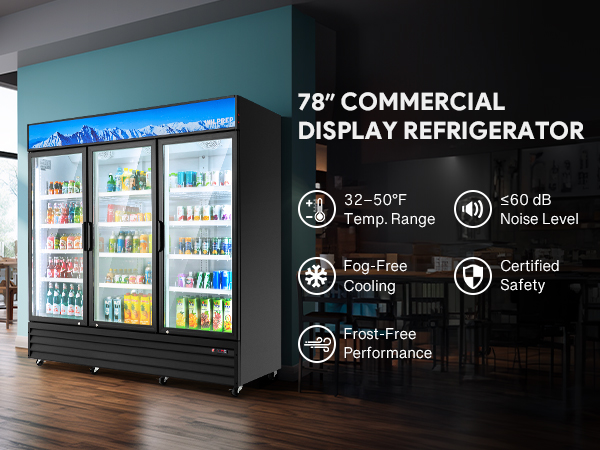
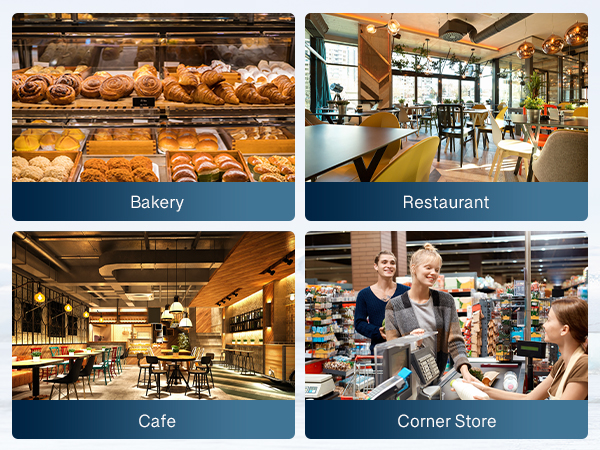
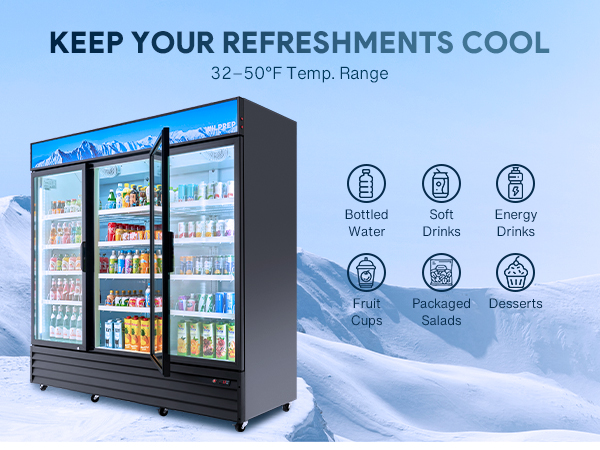
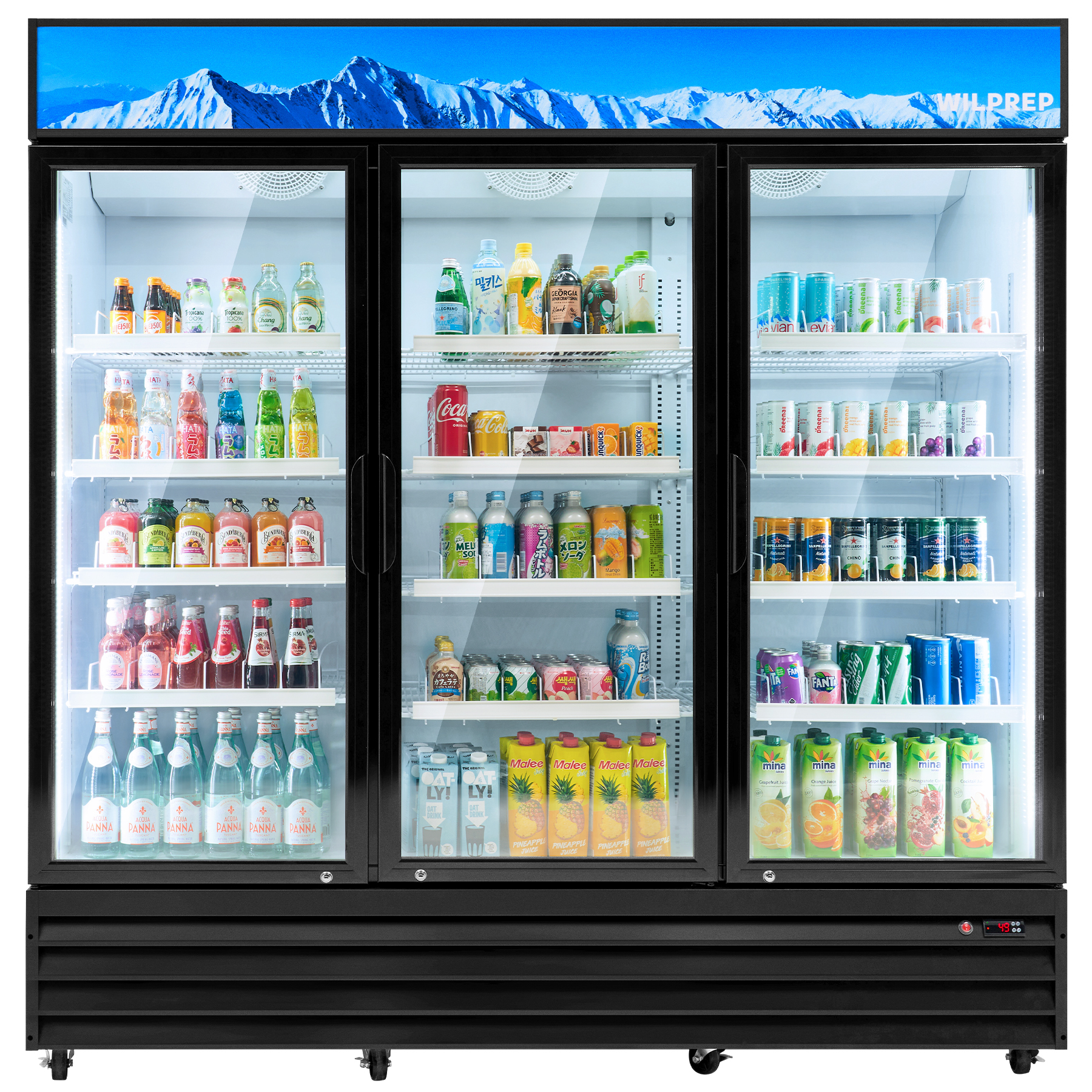
Specifications
- Rated Power: 700W
- Cooling Output Power: 845W
- Max. Noise Level: 60dB
- Temperature Range: 32-50°F (0-10°C)
- Recommended Ambient Temp.: 60-109°F (16-43°C)
- Total Effective Volume: 72.4 cu. ft. (2049 L)
- Overall Dimensions: 78.2 x 32.3 x 81 in. (198.5x82x205.8 cm)
- Number of Doors: 3
- Number of Shelves: 12
- Shelf Capacity (ea.): 88 lb. (40 kg)
- Power Cord Length: 8 ft. 2 in. (2.5 m)
- Net Weight: 685.6 lb. (311 kg)
- Refrigerant Type: R-290
- Refrigerant Charge: 5.1 oz. (145 g)
- Warranty: 1 Year
Packing List
1x Merchandiser Refrigerator
1x Instruction Manual
Swing Door Beverage Cooler:
Wilprep's ETL listed merchandiser refrigerator offers a spacious effective volume of 72.4 cu. ft. & an adjustable temp. range of 32-50℉, perfect for displaying soda can, yogurt, packaged salad, and fruit cup in bars, offices, convenience stores, and more!
Keep Your Drinks Ice-Cold:
Our single door commercial refrigerator uses double-layer tempered glass along with Low-E coating that helps reflect heat, prevents frost on the glass surface, and keeps the cold air locked inside.
12 Adjustable Shelves:
The commercial refrigerator is designed with 12 adjustable and removable shelves. Easily adjust the height of the shelves to find just the right fit for even taller sized cans and bottles.
Customizable Lightbox:
Whether you want to showcase your business or add a stylish touch to your bar, the customizable lightbox located on the top of this beverage display fridge has got you covered!
Fast & Stable Cooling:
This commercial beverage refrigerator utilizes an efficient air cooling system and features serrated fan blades, ensuring sufficient airflow with a noise level as low as 60dB.
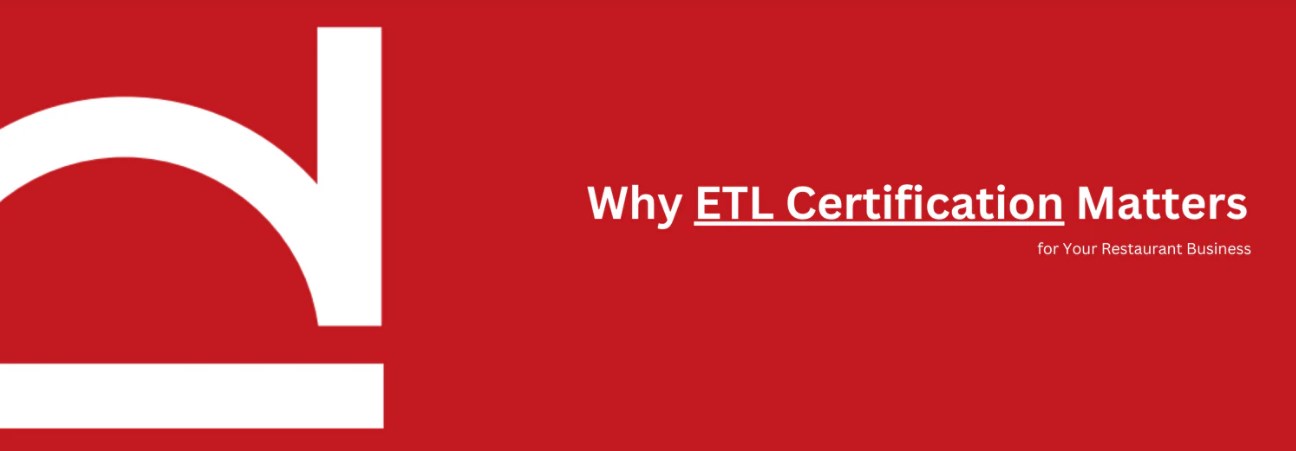
Performance Benefits
The ETL mark certifies appliances meet uniform industry standards for efficiency and operation. For example, it validates the stated power output, temperature consistency and temperature recovery times through repeated testing. Accurate BTU ratings and electricity loads are important for choosing adequately sized equipment and estimating operating costs.
ETL also verifies critical airflow, ventilation, humidity and air turnover rates for optimal cooking conditions. It ensures ovens maintain proper temperatures for baking, broilers reach searing heats evenly, and refrigerators hold set temperatures consistently. Passing these live testing parameters proves reliable, consistent performance.
Regulatory Benefits
Most jurisdictions require ETL listing for commercial kitchen equipment. In New York City, for example, all cooking appliances must meet ETL sanitation standards per the NYC health code. Having ETL certified appliances simplifies permitting and inspections for new restaurants. It also prevents violations or fines from regulators.
Additionally, many leasing companies and commissary kitchens mandate ETL equipment certification. It provides them assurance your appliances meet safety codes.
ETL certification can even lower insurance costs. Some providers offer discounts on fire/liability insurance for commercial kitchens with ETL certified appliances.

ETL Sanitation Certification
ETL Sanitation Certified appliances have undergone rigorous testing to verify hygienic design and cleanability. The certification focuses entirely on sanitation factors, including:
- Food contact zones isolated from sources of contamination
- Materials that are non-toxic, non-absorbent, and corrosion resistant
- Accessible and smooth surfaces for thorough cleaning
- Preventing ingress of bacteria, viruses, insects, or dust
- No niches where food or liquids can accumulate
- Capable of being washed, rinsed, and sanitized
By meeting the strict criteria of NSF/ANSI standards for hygiene and cleanability, ETL Sanitation Certification validates appliances are designed to minimize microbial risks and prevent cross-contamination.
ETL Certification
While ETL Sanitation covers sanitation, ETL Certification deals with the operational integrity and electrical safety of commercial appliances. Key aspects include:
- Electrical hazards like shock, electrocution, fire, and explosion
- Heating consistency for ovens, ranges, and dishwashers
- Temperature regulation for refrigerators, prep tables, and display units
- Ventilation requirements for proper airflow and humidity
- Gas safety for appliances using natural gas or propane
- Voltage fluctuations, grounding, cord connections, and wiring
- Compliance with UL safety standards and requirements
ETL Certification ensures equipment functions safely and as intended in the commercial kitchen environment after long-term use and wear.
Do Appliances Need Both?
<











